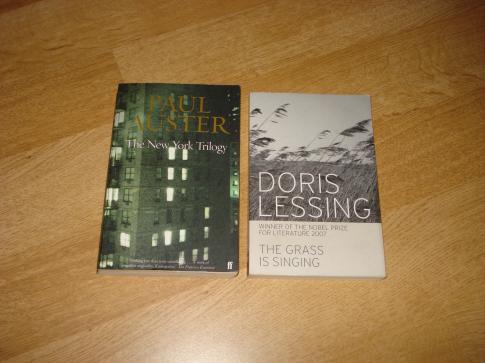Judging by the cover

The classical approach to bookbinding involves the use of dyed calfskin or goatskin laid over with contrasting colour; the tooling is either gold or blind (meaning no gold is used). More experimental structures combine fabric, wire, beads, wood and skin in unusual ways.
by A.C.
ELEGANT bookbindings might not seem to have much of a place in the modern world. E-books barely have graphics, much less finely crafted covers. Yet the love of handmade books as beautiful objects persists and, as a new travelling exhibit shows, retains many adherents.
"Inside Out: Contemporary Bindings of Private Press Books" is an unusual display of book art that brings together leading private presses in Britain and America with the Designer Bookbinders, a global society of artisans based in Britain. A total of 65 contemporary bindings of wildly varied material and design are on display at St Bride's printing library in London and will travel over the next year to America's leading fine book centres in Boston, Minnesota, New York and San Francisco.
The classical approach to bookbinding involves the use of dyed calfskin or goatskin laid over with contrasting colour; the tooling is either gold or blind (meaning no gold is used). More experimental structures combine fabric, wire, beads, wood and skin in unusual ways. Bookbinding exhibitions generally confine themselves to displaying the covers. But this show also includes sample pages from the books that inspired the 59 participating binders: each binding is a response to a particular work. The binders chose among books printed by nine private presses, and let their imaginations run wild. Half the pleasure for the viewer is in comparing different binders' responses to the same text, whether it be versions of Henry Thoreau's notebooks, Benjamin Franklin's autobiography or dark poems inspired by a North Sea oil rig. Some of the most arresting bindings were inspired by books made by a Wisconsin printer and wood engraver called Gaylord Schanilec. His edition of "Mayflies of the Driftless Region" by Clarke Garry, a book that details the insect's ephemeral life cycle, is a case in point.
Patricia Owen of California has fashioned a beetle-like shell in black and grey goatskin with green suede flyleaves, as if the mayfly had just alighted. Jenni Grey, a British binder, interprets it with a green velvet binding minutely stitched with beads and shimmering threads in a subtle and evocative design. Todd Pattison of Boston has a dark blue goatskin classically onlaid with a mayfly wing in gold and green. Ursula Mitra of New York has contributed a shimmering mica-covered volume meant to evoke a swarm of flies, encased in a leather box depicting the mayfly's life cycle. Peter Verheyen, another American, screens the insects through a sheet of vellum held by strips of salmon skin. The approaches could not be more different, but the craftsmanship and materials are unfailingly impressive.
It takes easily 100 to 200 hours to make such a binding, says Stephen Conway, the president of the Designer Bookbinders, whose own cover for "Britten's Aldeburgh" from the Shanty Bay Press is another standout of the show. The 600-strong society actively supports ten younger binders a year as "licentiates" to continue the hand-binding tradition, and many flock to London from Asia in particular, he says. The appeal of handcrafting in the internet age is undeniable, agrees Stuart Brockman, an engineer trained at Imperial College who threw in a technology career 18 years ago to bind books at his father's firm in Oxfordshire.
Bookbinders view themselves as craftspeople, combining traditional skills with a contemporary design sensibility. But to Simon Eccles, a British book-collector and the patron who conceived this exhibit, designer bookbindings are objets d'art. The art market has long overlooked them as collectibles, Mr Eccles says. Apart from a few specialised booksellers, auctions of contemporary works are few and far between. This show is his effort to bring more attention to these jewels of the craft, which range in price from $1,000 to $11,000. "The joy of a book is that you take it off the shelf and it's like Christmas," he said, after presiding over an initial auction of the works on view. "You open the box and you get the most wonderful lift."
"Inside Out" is at the St Bride Foundation, Bride Lane, off Fleet Street, until August 22nd 2014. Visit Designer Bookbinders for international tour dates in 2014 and 2015.




 del.icio.us
del.icio.us Digg
Digg

Post your comment